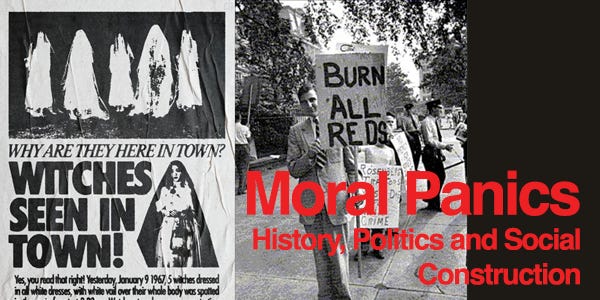Morning Comrades.
Monday’s dispatch had me thinking more about Moral Panics than I probably should have and I have tried to reduce most of my “I want to scream” thoughts into a more coherent and worthy of your time piece below. This is going to be a two part dispatch, where in the first we focus a little on this history and the mechanics and philosophy, the bigger picture in the second part that I will publish on Friday.
As mentioned on Monday, if you are of a certain age you will remember a number of these outrages and personally, the one that stuck the most, or, rather, had the most impact at an early age was the insane period when Tipper Gore, the former Second Lady of the US, and her merry bunch of fanatical bored boomers lost their collective mind over Heavy Metal. By 1985, Satan lurked in every suburb, reports of ritual sacrifice proliferated, and panicky parents threw away scores of heavy metal, punk, and rock'n'roll records in an effort to protect their little angels from the left-hand path. Not even Prince or "Darling Nikki" were spared. This period of moral outrage and fear was egged on by the diabolical propaganda of Tipper Gore's histrionic Parents Music Resource Center (PMRC) and their infamous Filthy Fifteen list—a document that pilloried fifteen seemingly arbitrarily-chosen songs for their supposed sexual, pro-drug, or occult themes.
Gore and her fellow Washington Wives sought to save the children from raunch and sleaze by introducing a mandatory rating system (the origins of those pesky black and white Parental Guidance: Explicit Lyrics stickers that stood between you and the second Limp Bizkit record way back when). As their crusade intensified, rock music itself came under fire, so much that Frank Zappa, John Denver, and Twisted Sister's Dee Snider ended up defending the faith in front of a Senate Committee. Of course, their counterparts overseas were less affected—profoundly so, as Ladouceur discovered. While someone like Dee Snider from Twisted Sister was appearing as a witness to defend his art, across the pond, bands like Venom and King Diamond weren’t even aware their lyrics were being brought before the U.S. senate. It’s not like they would have been getting calls about their records being pulled from record shops — these were underground metal bands on independent labels that weren’t even that easy to find in North America. If you read interviews with them today they’ll tell you they even didn’t learn of this for years, and by then it was just another silly footnote in their histories of pissing people off.
While the Satanic Panic ulimately didn't do much to harm heavy metal—if anything, it made it look more enticing to rebellious teens—the Panic itself left a darker stain on the fabric of society. The wrongly incarerated West Memphis Three languished in prison for decades as victims of the time period's most high-profile witch hunt.
It was something to have witnessed.
Obviously, though, this wasn’t the first entirely engineered Moral Panic that came out of the US and it certainly wasn’t going to be the last. For the fact remains, that scaring parts of your population, is one of the few proven to work game plays in the Ruling Class when it comes to coercion. In this context, we have to replay the infamous proverb to : A Scared Dog is an Obedient Dog.
Keep reading with a 7-day free trial
Subscribe to Black Lodges to keep reading this post and get 7 days of free access to the full post archives.




